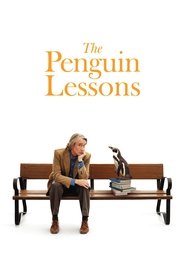Watch The Penguin Lessons (2025) Movie

In 1976, as Argentina descends into violence and chaos, a world-weary English teacher regains his compassion for others thanks to an unlikely friendship with a penguin.

In 1976 Argentina, on the eve of a political revolution, a teacher and his students at an exclusive boys school are enlightened by an unusual guest. - 1970s
## Beyond the Ice Floe: The Enduring Lesson of Juan Salvador the Penguin (A Penguin Lessons Deep Dive)
Tom Michell's "The Penguin Lessons" is more than just a feel-good story about a rescued penguin. It’s a nuanced exploration of companionship, responsibility, and the unexpected ways in which life can teach us profound lessons. While the initial charm lies in the sheer absurdity of a British teacher smuggling a Magellanic penguin onto a South American rugby team, the book's true power resides in the lasting impact Juan Salvador, the penguin, has on Michell's life and the lives of those around him.
The story, as many know, begins with Michell rescuing a penguin covered in oil, destined for a grim fate. He names him Juan Salvador, after Richard Bach's daring seagull, a nod to the penguin's spirit and his own unconventional decision. What follows is a series of humorous and heartwarming anecdotes detailing Juan Salvador's integration into the lives of Michell and his students at a boarding school in Argentina.
However, to reduce the narrative to just heartwarming penguin antics is to miss the core of its message. The crucial element, and where the book truly excels, lies in the portrayal of the *challenges* Michell faces. He's not just dealing with a quirky pet; he's responsible for the well-being of a wild animal in an entirely unnatural environment. This responsibility forces him to confront his own anxieties, his fears of failure, and his inherent desire to provide for another being.
The book doesn't shy away from depicting the difficulties. Juan Salvador isn't always easy. He’s messy, demanding, and completely unaware of social norms. Michell constantly grapples with the logistical nightmares of penguin care, the disapproval of some colleagues, and the underlying knowledge that this isn't a sustainable long-term solution.
And that’s the point. The book subtly questions our inherent tendency to “rescue” without fully understanding the consequences or considering the best interests of the rescued. Michell’s affection for Juan Salvador never wavers, but he’s also forced to acknowledge the unnaturalness of their situation. This internal conflict is what elevates the book beyond a simple animal story.
The true brilliance of "The Penguin Lessons" lies in the unresolved tension surrounding Juan Salvador's future. While the ending offers a sense of closure – Juan Salvador thrives, integrates into the school, and even finds a mate – it’s also tinged with a bittersweet understanding. We, as readers, are left pondering the ethics of keeping a wild animal in captivity, even if it's with the best intentions.
Furthermore, the impact Juan Salvador has on Michell's students is profound. The penguin becomes a symbol of resilience, adaptability, and the importance of embracing the unconventional. He teaches the boys about empathy, responsibility, and the beauty of the natural world, fostering a connection that transcends the classroom.
Ultimately, "The Penguin Lessons" is not just about a penguin; it’s about the profound and unexpected ways in which animals can shape our lives and challenge our perspectives. It's a reminder that even in the most seemingly absurd circumstances, we can find meaning, learn valuable lessons, and forge bonds that transcend species. The real lesson of Juan Salvador isn't just about penguin care; it's about the enduring power of connection and the responsibility that comes with it, a lesson that resonates long after the final page is turned. The book reminds us that sometimes, the most profound lessons come from the most unexpected teachers, even one waddling in flippers.

Post a Comment